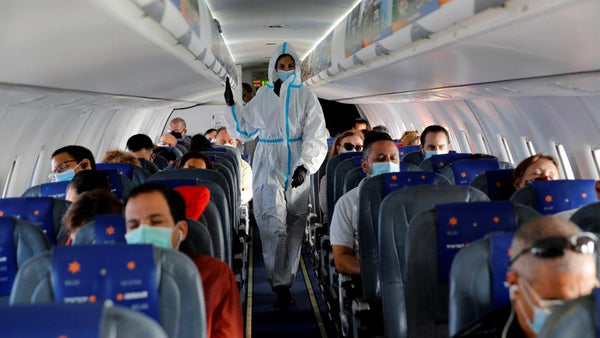Are you still planning on traveling for the upcoming holidays in spite of surging coronavirus cases in the United States? Then you should be aware that COVID-19 symptom screenings such as those carried out at airports have been deemed ineffective by the Centers for Disease Control and Prevention (CDC).
Since rapid testing is not readily abundant yet, many institutions and organizations have implemented a strategy of temperature-taking and simple questioning about symptoms to help reopen the economy. But it turns out this approach doesn't help much in identifying asymptomatic COVID-19 carriers.
A Resource-Intensive Effort With Little Benefit
With help from the Department of Homeland Security, the CDC screened passengers arriving at airports in the U.S. from countries with high COVID-19 activity between January and September. Officials ended up screening more than 766,000 airline passengers. Of those, only 35 travelers were tested for the coronavirus, and just nine tested positive. This equates to one positive case per 85,000 passengers screened. As if this wasn't bad enough, officials reported that they were missing contact information for a significant number of screened travelers.
Unsurprisingly, the CDC stated that these screening efforts were more trouble than they were actually worth in its Morbidity and Mortality Weekly Report. The endeavor was ultimately classified as "ineffective" since COVID-19 carriers may not show symptoms even when they are contagious.
The screenings involved a no-contact temperature reading, observation for signs of symptoms, and a questionnaire about potential signs of illness and exposure. Any travelers found to be ill or exposed to someone else who was COVID-19 positive were referred to a medical officer for more meticulous evaluation.
Coronavirus Screenings Are No Guarantee of Safety
There have always been questions about the efficacy of airport screenings, even when they were being conducted in full force. During the past summer, TSA head David Pekoske made it known that temperature checks offered no guarantee that passengers didn't have COVID-19.
Another study that was recently published in the New England Journal of Medicine came to the same conclusion as the CDC. In it, Navy researchers tested, followed, and quarantined 2,000 Marine Corps recruits before the commencement of their basic training. Despite daily temperature checks and screenings, few COVID-19 carrying recruits displayed any symptoms of the virus before a nasal swab diagnosed them with it.
"This suggests that relying on symptom screening and temperature checks alone, it’s not very effective in finding infected individuals," explains Dr. Stuart Sealfon of the Icahn School of Medicine at Mount Sinai. "All of the infected individuals were found by scheduled tests that were done independent of the presence of symptoms or elevated temperature."
Even with airport screenings in place, coronavirus cases have continued to skyrocket in the U.S. To date, the virus has claimed the lives of more than 300,000 Americans and infected another 11 million across the country. And every day seems to break the record high of new daily cases.
Taking a Flight Is Still Taking a Gamble
In September, the CDC ended its screening tests in order to focus on other coronavirus mitigation efforts such as contact tracing, testing, and quarantining. "By refocusing out mitigation efforts on individual passenger risk throughout the air travel journey, the [U.S. government] can most effectively protect the health of the American public," officials of the organization stated in a press release.
Similarly, the airline industry has also pivoted to more passenger testing and making face mask protection a requirement. Flights to Hawaii even recently started offering rapid COVID-19 testing for passengers. And United Airlines now has free coronavirus testing for any flights between London, Neward, and New Jersey. Last but not least, Los Angeles International Airport opened up 24-hour-turnaround testing sites.
A Department of Defense study found that flying on an airplane is relatively safe as far as COVID-19 risk goes. But this requires that the plane has proper air filtration systems in place and that all passengers wear face masks. Still, it's clear that many Americans do not feel safe boarding a plane these days — airline travel volumes are only 63% of what they were a year ago.
The risk of catching COVID-19 at the airport on an airplane is still a valid concern, especially when you consider that the U.S. continues to set new records for infections and deaths almost every single day. Many healthcare facilities are either near or already over capacity across the country. And since death rates tend to lag a few weeks behind hospitalizations, it seems that a rise in mortality numbers is inevitable.
With all this said, please think if it's really necessary to travel over the upcoming holidays. Consider not only yourself but your loved ones as well. And, as always, practice social distancing, wash your hands frequently, and don't forget to don your face mask or neck gaiter whenever you're out in public.
Want to distribute anti-microbial treated neck gaiters and face masks that protect you from 99.9% of bacteria, viruses, mold, and fungus? Learn more here!



